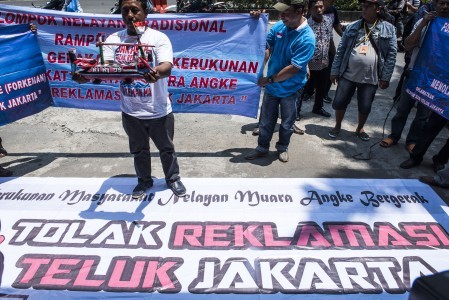Popular Reads
Top Results
Can't find what you're looking for?
View all search resultsPopular Reads
Top Results
Can't find what you're looking for?
View all search resultsEnvironmental analysis documents flawed in reclamation project , experts warn
Change text size
Gift Premium Articles
to Anyone
E
nvironmental researchers have noted flaws in the environmental impact analysis (Amdal) documents used as green lights by the city administration to grant developers permission to proceed with the controversial mega reclamation projects in Jakarta Bay.
Jakarta Governor Basuki "Ahok" Tjahaja Purnama had granted five Jakarta Bay reclamation permits: G Islet, to PT Muara Wisesa Samudera, F Islet to PT Jakarta Propertindo, I Islet to PT Jaladri Kartika Eka Paksi, K Islet to PT Pembangunan Jaya Ancol and H Islet to PT Taman Harapan Indah.
While each of those companies had submitted Amdal documemnts, approved by the administration, there were flaws discovered in the documents of I and K islets, head of research at the Nahdliyin Front for the Sovereignity of Natural Resources (FNKSDA) Bosman Batubara said.
To acquire a construction project by the local government developers must possess Amdal, it is a requirement.
The documents lack geochemistry measures of the thickness and toxic sediment around the reclamation area, he said.
A research document entitled Rapid Environmental Assessment for Coastal Development in Jakarta Bay published by Denmark-based company DHI Water & Environment at the request of Indonesia's Ministry of Environment, showed that Jakarta bay had been severely polluted by a Copper and Zinc substance.
As such sediment would enter the sea water through the reclamation project, it may impact the biota in the bay as well as people living in the area. An excess of the toxic substance copper may damage organ function and cause anemia, liver and or kidney problems and intestine irritation.
While zinc may cause skin disease due to its corrosive characteristics and damage nerve membranes, according to the research document, published in 2011.
The research was used as a Term of Reference for the Jakarta Bay reclamation project, Bosman said, however the city administration that issued Amdal did not take the research into consideration.
"Although the DHI water document warned of the dangers of the toxic substances in the sediment, if it entered the seawater, the city administration did not include it in its Amdal documents," Bosman told thejakartapost.com on Friday.
Meanwhile, Bandung Institute of Technology’s (ITB) Coastal Technical Expertise Group head Muslim Muin believed that the Amdal of the reclaimed islets were invalid.
The mega reclamation project would only cause the capital to face enormous environmental costs such as flooding, the loss of mangrove conservation areas and water pollution.
The construction of the islets would also extend the river flow in the city. Such an extension would cause the water to flow slower amid Jakarta's already bad drainage system, Muslim said.
"Such conditions will lead to severe flooding in the capital," Muslim said during a telephone interview.
Moreover, the reclamation project would also change the characteristics of the water in the mangrove area, which will gradually turn from salty water to fresh.
“It will be difficult for the salt water to enter the mangrove area, and this will kill the plantations. We will lose the natural resources of the sea as a result of this project," he added.
The Indonesian Forum for the Environment (WALHI) also urged the administration to stop the ambitious projects citing that, in addition to being connected to the alleged case of corruption, reclamation would threaten the environment.
Walhi has recorded sand theft in coastal areas in Banten, West Java, Lampung and Bangka Belitung that is allegedly related to reclamation project. To create, the vast 5,155 hectares of new land would require at least 600 million cubic meters of sand to be transported from other provinces.
Some of the islands within Jakarta's Thousands Island area have disappeared as a result of recent sand theft, Walhi Jakarta member Mustaqiem Dahlan said on Friday.
Ahok, however, has insisted on proceeding with the reclamation project. The 17 manmade islets will cost an estimated Rp 150 trillion ($11.4 billion) in investment.
The governor argued that he had complied with regulations, the 1995 Presidential Decree issued by the late president Soeharto, when issuing the reclamation permits. (rin)










